The Role of Organisational Learning in Improving Organisational Performance
VerifiedAdded on 2023/06/17
|11
|3292
|311
AI Summary
This essay discusses the importance of organisational learning in improving organisational performance. It analyses the role of organisational learning in Boots Limited, a retail and pharmacy company, and how it uses learning development theories such as behaviourist learning theory, constructivist learning model, and experiential learning theory to enhance performance. The essay also highlights the barriers to organisational learning and the importance of leadership development. Subject: Business Management. Course Code: Not mentioned. Course Name: Not mentioned. College/University: Not mentioned.
Contribute Materials
Your contribution can guide someone’s learning journey. Share your
documents today.
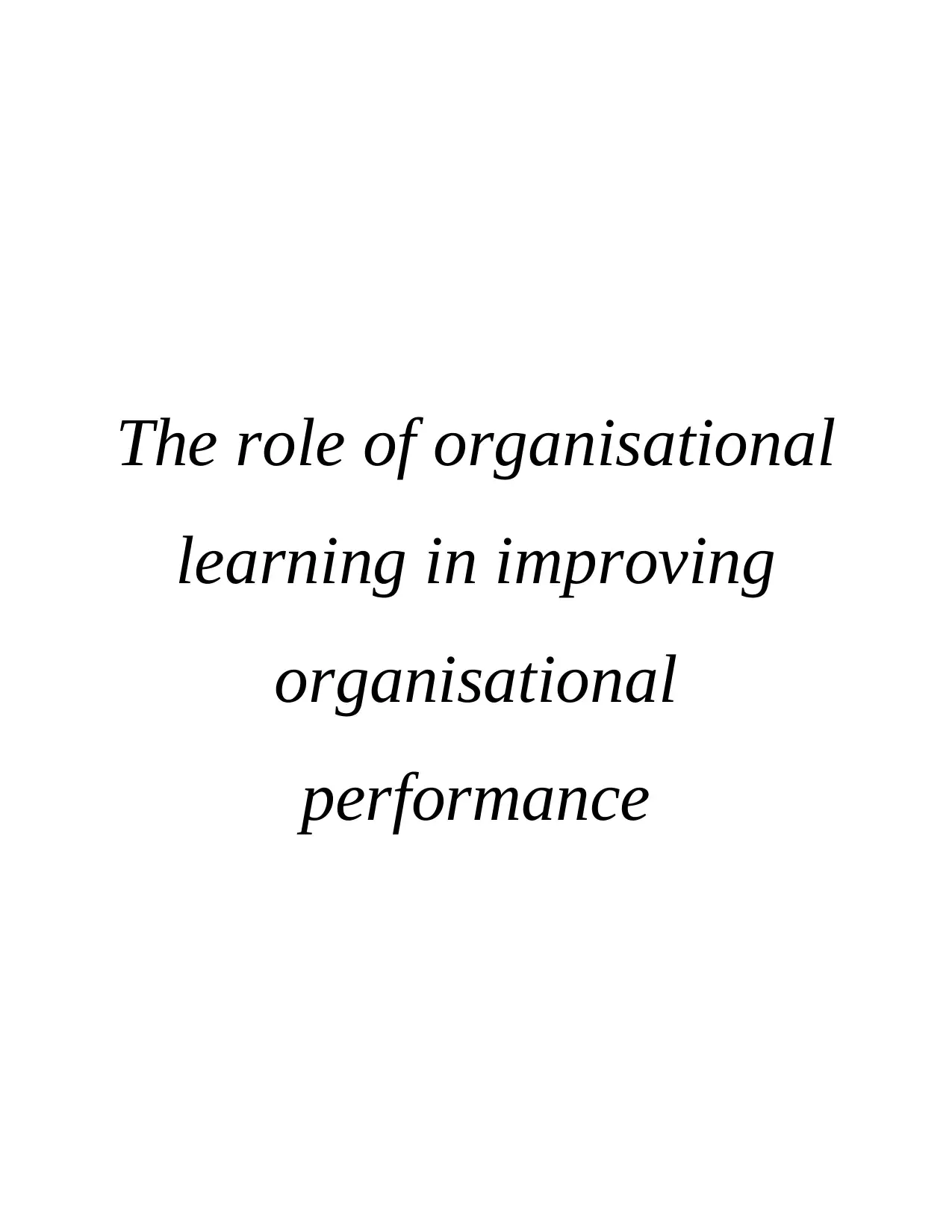
The role of organisational
learning in improving
organisational
performance
learning in improving
organisational
performance
Secure Best Marks with AI Grader
Need help grading? Try our AI Grader for instant feedback on your assignments.
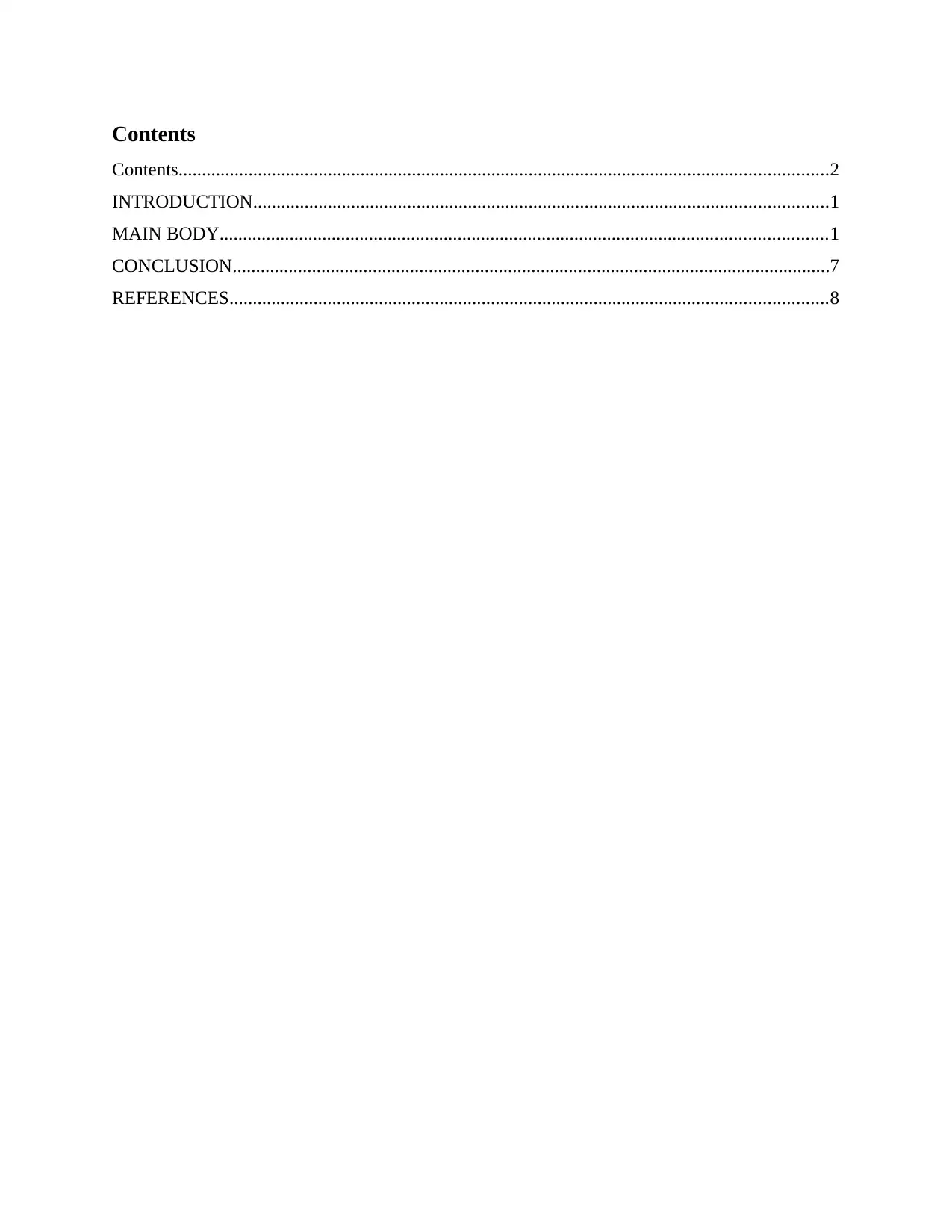
Contents
Contents...........................................................................................................................................2
INTRODUCTION...........................................................................................................................1
MAIN BODY..................................................................................................................................1
CONCLUSION................................................................................................................................7
REFERENCES................................................................................................................................8
Contents...........................................................................................................................................2
INTRODUCTION...........................................................................................................................1
MAIN BODY..................................................................................................................................1
CONCLUSION................................................................................................................................7
REFERENCES................................................................................................................................8
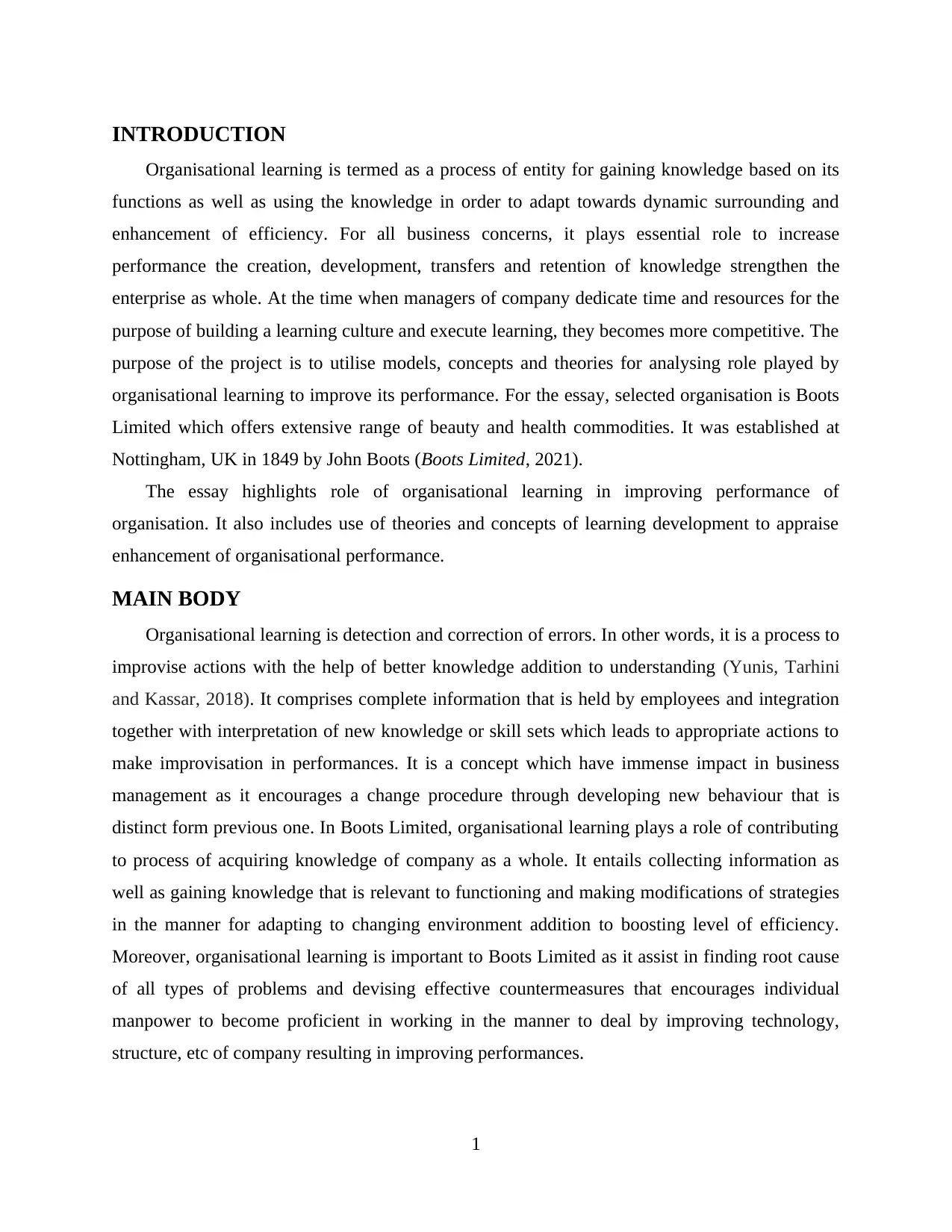
INTRODUCTION
Organisational learning is termed as a process of entity for gaining knowledge based on its
functions as well as using the knowledge in order to adapt towards dynamic surrounding and
enhancement of efficiency. For all business concerns, it plays essential role to increase
performance the creation, development, transfers and retention of knowledge strengthen the
enterprise as whole. At the time when managers of company dedicate time and resources for the
purpose of building a learning culture and execute learning, they becomes more competitive. The
purpose of the project is to utilise models, concepts and theories for analysing role played by
organisational learning to improve its performance. For the essay, selected organisation is Boots
Limited which offers extensive range of beauty and health commodities. It was established at
Nottingham, UK in 1849 by John Boots (Boots Limited, 2021).
The essay highlights role of organisational learning in improving performance of
organisation. It also includes use of theories and concepts of learning development to appraise
enhancement of organisational performance.
MAIN BODY
Organisational learning is detection and correction of errors. In other words, it is a process to
improvise actions with the help of better knowledge addition to understanding (Yunis, Tarhini
and Kassar, 2018). It comprises complete information that is held by employees and integration
together with interpretation of new knowledge or skill sets which leads to appropriate actions to
make improvisation in performances. It is a concept which have immense impact in business
management as it encourages a change procedure through developing new behaviour that is
distinct form previous one. In Boots Limited, organisational learning plays a role of contributing
to process of acquiring knowledge of company as a whole. It entails collecting information as
well as gaining knowledge that is relevant to functioning and making modifications of strategies
in the manner for adapting to changing environment addition to boosting level of efficiency.
Moreover, organisational learning is important to Boots Limited as it assist in finding root cause
of all types of problems and devising effective countermeasures that encourages individual
manpower to become proficient in working in the manner to deal by improving technology,
structure, etc of company resulting in improving performances.
1
Organisational learning is termed as a process of entity for gaining knowledge based on its
functions as well as using the knowledge in order to adapt towards dynamic surrounding and
enhancement of efficiency. For all business concerns, it plays essential role to increase
performance the creation, development, transfers and retention of knowledge strengthen the
enterprise as whole. At the time when managers of company dedicate time and resources for the
purpose of building a learning culture and execute learning, they becomes more competitive. The
purpose of the project is to utilise models, concepts and theories for analysing role played by
organisational learning to improve its performance. For the essay, selected organisation is Boots
Limited which offers extensive range of beauty and health commodities. It was established at
Nottingham, UK in 1849 by John Boots (Boots Limited, 2021).
The essay highlights role of organisational learning in improving performance of
organisation. It also includes use of theories and concepts of learning development to appraise
enhancement of organisational performance.
MAIN BODY
Organisational learning is detection and correction of errors. In other words, it is a process to
improvise actions with the help of better knowledge addition to understanding (Yunis, Tarhini
and Kassar, 2018). It comprises complete information that is held by employees and integration
together with interpretation of new knowledge or skill sets which leads to appropriate actions to
make improvisation in performances. It is a concept which have immense impact in business
management as it encourages a change procedure through developing new behaviour that is
distinct form previous one. In Boots Limited, organisational learning plays a role of contributing
to process of acquiring knowledge of company as a whole. It entails collecting information as
well as gaining knowledge that is relevant to functioning and making modifications of strategies
in the manner for adapting to changing environment addition to boosting level of efficiency.
Moreover, organisational learning is important to Boots Limited as it assist in finding root cause
of all types of problems and devising effective countermeasures that encourages individual
manpower to become proficient in working in the manner to deal by improving technology,
structure, etc of company resulting in improving performances.
1
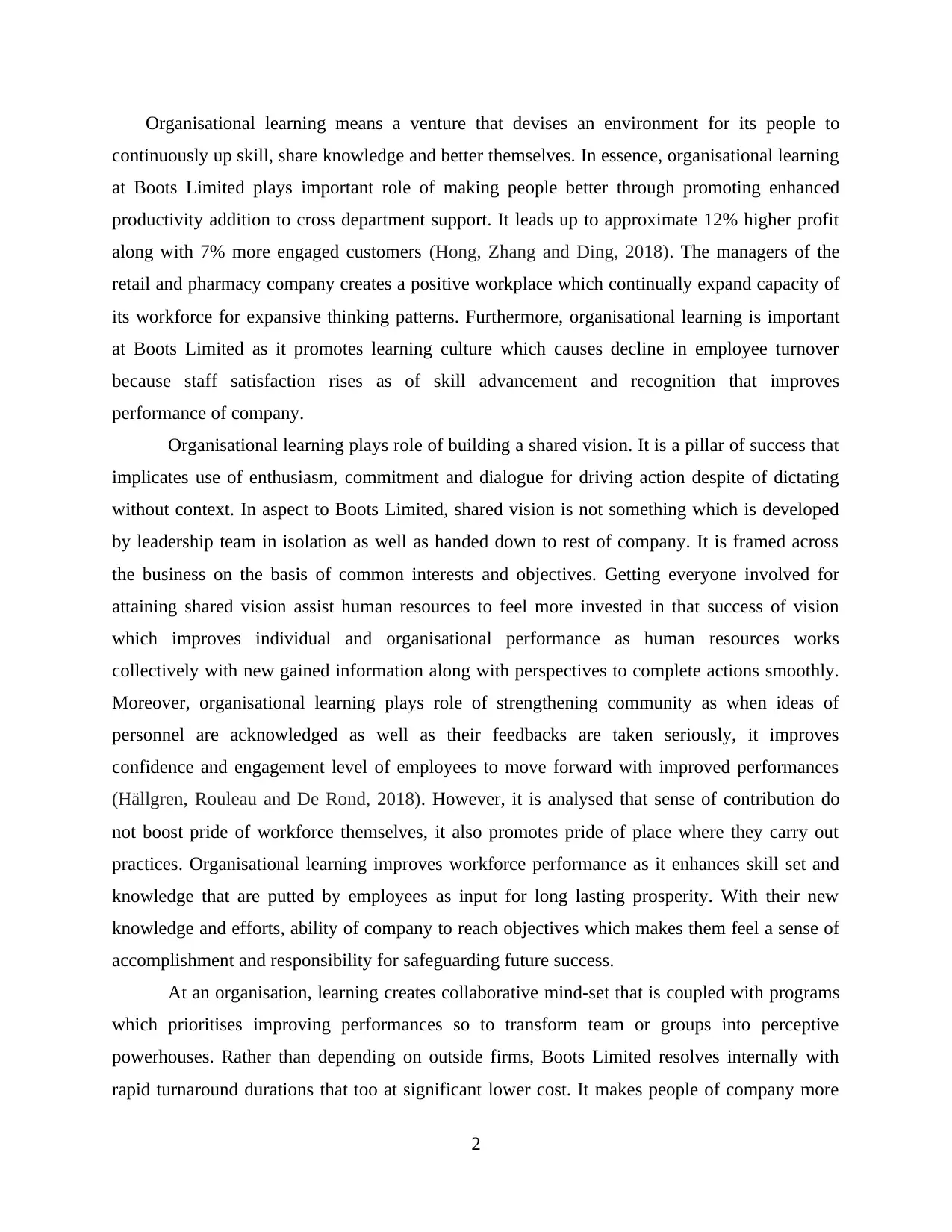
Organisational learning means a venture that devises an environment for its people to
continuously up skill, share knowledge and better themselves. In essence, organisational learning
at Boots Limited plays important role of making people better through promoting enhanced
productivity addition to cross department support. It leads up to approximate 12% higher profit
along with 7% more engaged customers (Hong, Zhang and Ding, 2018). The managers of the
retail and pharmacy company creates a positive workplace which continually expand capacity of
its workforce for expansive thinking patterns. Furthermore, organisational learning is important
at Boots Limited as it promotes learning culture which causes decline in employee turnover
because staff satisfaction rises as of skill advancement and recognition that improves
performance of company.
Organisational learning plays role of building a shared vision. It is a pillar of success that
implicates use of enthusiasm, commitment and dialogue for driving action despite of dictating
without context. In aspect to Boots Limited, shared vision is not something which is developed
by leadership team in isolation as well as handed down to rest of company. It is framed across
the business on the basis of common interests and objectives. Getting everyone involved for
attaining shared vision assist human resources to feel more invested in that success of vision
which improves individual and organisational performance as human resources works
collectively with new gained information along with perspectives to complete actions smoothly.
Moreover, organisational learning plays role of strengthening community as when ideas of
personnel are acknowledged as well as their feedbacks are taken seriously, it improves
confidence and engagement level of employees to move forward with improved performances
(Hällgren, Rouleau and De Rond, 2018). However, it is analysed that sense of contribution do
not boost pride of workforce themselves, it also promotes pride of place where they carry out
practices. Organisational learning improves workforce performance as it enhances skill set and
knowledge that are putted by employees as input for long lasting prosperity. With their new
knowledge and efforts, ability of company to reach objectives which makes them feel a sense of
accomplishment and responsibility for safeguarding future success.
At an organisation, learning creates collaborative mind-set that is coupled with programs
which prioritises improving performances so to transform team or groups into perceptive
powerhouses. Rather than depending on outside firms, Boots Limited resolves internally with
rapid turnaround durations that too at significant lower cost. It makes people of company more
2
continuously up skill, share knowledge and better themselves. In essence, organisational learning
at Boots Limited plays important role of making people better through promoting enhanced
productivity addition to cross department support. It leads up to approximate 12% higher profit
along with 7% more engaged customers (Hong, Zhang and Ding, 2018). The managers of the
retail and pharmacy company creates a positive workplace which continually expand capacity of
its workforce for expansive thinking patterns. Furthermore, organisational learning is important
at Boots Limited as it promotes learning culture which causes decline in employee turnover
because staff satisfaction rises as of skill advancement and recognition that improves
performance of company.
Organisational learning plays role of building a shared vision. It is a pillar of success that
implicates use of enthusiasm, commitment and dialogue for driving action despite of dictating
without context. In aspect to Boots Limited, shared vision is not something which is developed
by leadership team in isolation as well as handed down to rest of company. It is framed across
the business on the basis of common interests and objectives. Getting everyone involved for
attaining shared vision assist human resources to feel more invested in that success of vision
which improves individual and organisational performance as human resources works
collectively with new gained information along with perspectives to complete actions smoothly.
Moreover, organisational learning plays role of strengthening community as when ideas of
personnel are acknowledged as well as their feedbacks are taken seriously, it improves
confidence and engagement level of employees to move forward with improved performances
(Hällgren, Rouleau and De Rond, 2018). However, it is analysed that sense of contribution do
not boost pride of workforce themselves, it also promotes pride of place where they carry out
practices. Organisational learning improves workforce performance as it enhances skill set and
knowledge that are putted by employees as input for long lasting prosperity. With their new
knowledge and efforts, ability of company to reach objectives which makes them feel a sense of
accomplishment and responsibility for safeguarding future success.
At an organisation, learning creates collaborative mind-set that is coupled with programs
which prioritises improving performances so to transform team or groups into perceptive
powerhouses. Rather than depending on outside firms, Boots Limited resolves internally with
rapid turnaround durations that too at significant lower cost. It makes people of company more
2
Secure Best Marks with AI Grader
Need help grading? Try our AI Grader for instant feedback on your assignments.
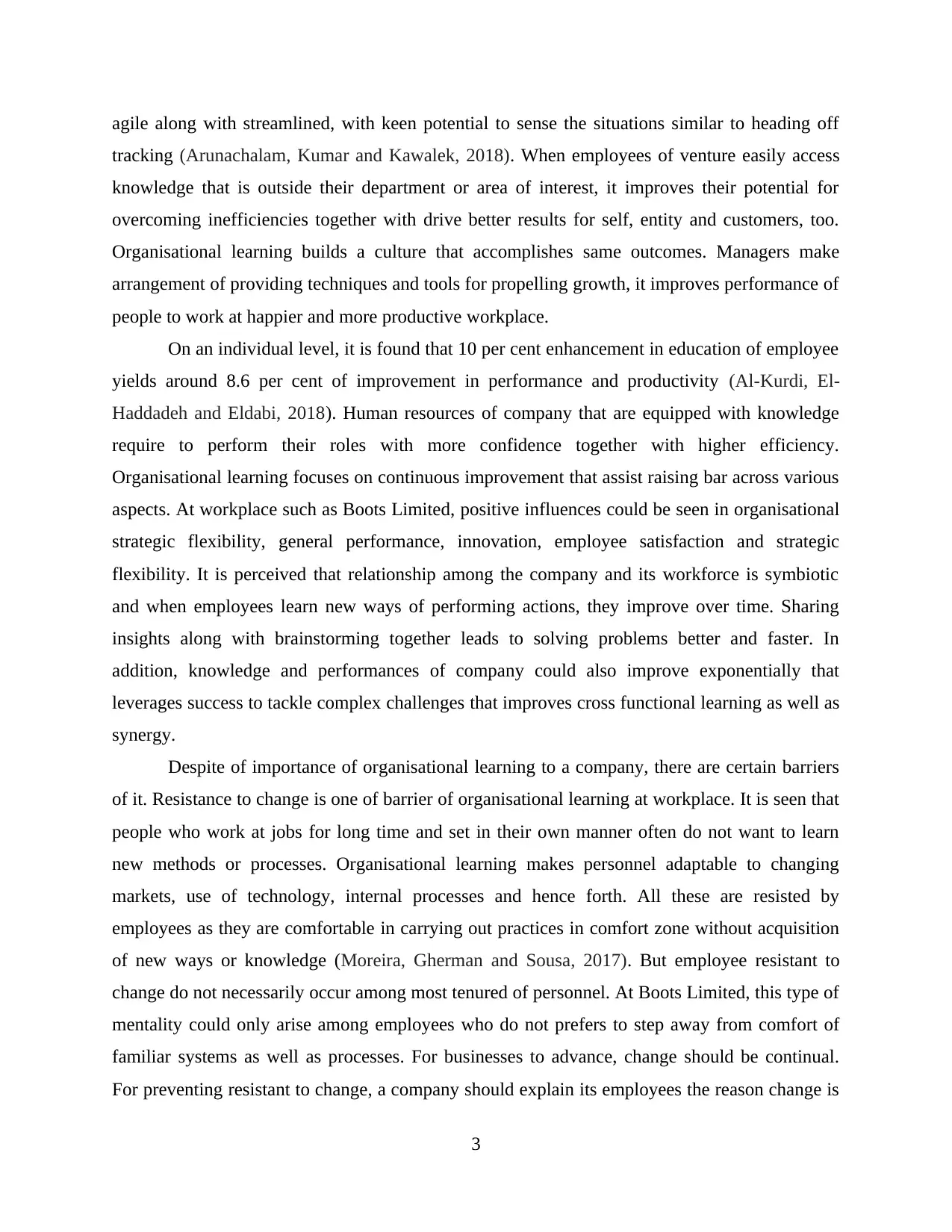
agile along with streamlined, with keen potential to sense the situations similar to heading off
tracking (Arunachalam, Kumar and Kawalek, 2018). When employees of venture easily access
knowledge that is outside their department or area of interest, it improves their potential for
overcoming inefficiencies together with drive better results for self, entity and customers, too.
Organisational learning builds a culture that accomplishes same outcomes. Managers make
arrangement of providing techniques and tools for propelling growth, it improves performance of
people to work at happier and more productive workplace.
On an individual level, it is found that 10 per cent enhancement in education of employee
yields around 8.6 per cent of improvement in performance and productivity (Al-Kurdi, El-
Haddadeh and Eldabi, 2018). Human resources of company that are equipped with knowledge
require to perform their roles with more confidence together with higher efficiency.
Organisational learning focuses on continuous improvement that assist raising bar across various
aspects. At workplace such as Boots Limited, positive influences could be seen in organisational
strategic flexibility, general performance, innovation, employee satisfaction and strategic
flexibility. It is perceived that relationship among the company and its workforce is symbiotic
and when employees learn new ways of performing actions, they improve over time. Sharing
insights along with brainstorming together leads to solving problems better and faster. In
addition, knowledge and performances of company could also improve exponentially that
leverages success to tackle complex challenges that improves cross functional learning as well as
synergy.
Despite of importance of organisational learning to a company, there are certain barriers
of it. Resistance to change is one of barrier of organisational learning at workplace. It is seen that
people who work at jobs for long time and set in their own manner often do not want to learn
new methods or processes. Organisational learning makes personnel adaptable to changing
markets, use of technology, internal processes and hence forth. All these are resisted by
employees as they are comfortable in carrying out practices in comfort zone without acquisition
of new ways or knowledge (Moreira, Gherman and Sousa, 2017). But employee resistant to
change do not necessarily occur among most tenured of personnel. At Boots Limited, this type of
mentality could only arise among employees who do not prefers to step away from comfort of
familiar systems as well as processes. For businesses to advance, change should be continual.
For preventing resistant to change, a company should explain its employees the reason change is
3
tracking (Arunachalam, Kumar and Kawalek, 2018). When employees of venture easily access
knowledge that is outside their department or area of interest, it improves their potential for
overcoming inefficiencies together with drive better results for self, entity and customers, too.
Organisational learning builds a culture that accomplishes same outcomes. Managers make
arrangement of providing techniques and tools for propelling growth, it improves performance of
people to work at happier and more productive workplace.
On an individual level, it is found that 10 per cent enhancement in education of employee
yields around 8.6 per cent of improvement in performance and productivity (Al-Kurdi, El-
Haddadeh and Eldabi, 2018). Human resources of company that are equipped with knowledge
require to perform their roles with more confidence together with higher efficiency.
Organisational learning focuses on continuous improvement that assist raising bar across various
aspects. At workplace such as Boots Limited, positive influences could be seen in organisational
strategic flexibility, general performance, innovation, employee satisfaction and strategic
flexibility. It is perceived that relationship among the company and its workforce is symbiotic
and when employees learn new ways of performing actions, they improve over time. Sharing
insights along with brainstorming together leads to solving problems better and faster. In
addition, knowledge and performances of company could also improve exponentially that
leverages success to tackle complex challenges that improves cross functional learning as well as
synergy.
Despite of importance of organisational learning to a company, there are certain barriers
of it. Resistance to change is one of barrier of organisational learning at workplace. It is seen that
people who work at jobs for long time and set in their own manner often do not want to learn
new methods or processes. Organisational learning makes personnel adaptable to changing
markets, use of technology, internal processes and hence forth. All these are resisted by
employees as they are comfortable in carrying out practices in comfort zone without acquisition
of new ways or knowledge (Moreira, Gherman and Sousa, 2017). But employee resistant to
change do not necessarily occur among most tenured of personnel. At Boots Limited, this type of
mentality could only arise among employees who do not prefers to step away from comfort of
familiar systems as well as processes. For businesses to advance, change should be continual.
For preventing resistant to change, a company should explain its employees the reason change is
3
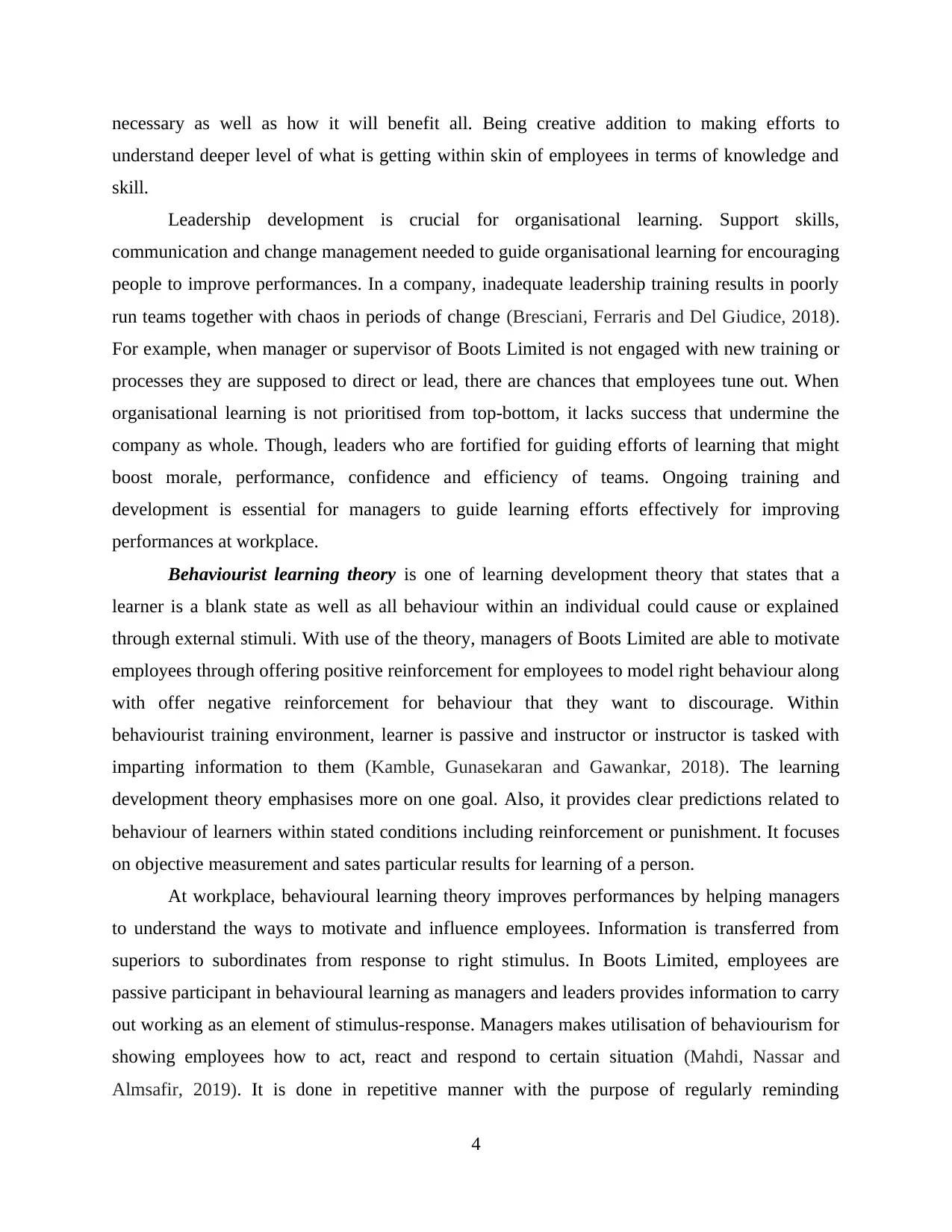
necessary as well as how it will benefit all. Being creative addition to making efforts to
understand deeper level of what is getting within skin of employees in terms of knowledge and
skill.
Leadership development is crucial for organisational learning. Support skills,
communication and change management needed to guide organisational learning for encouraging
people to improve performances. In a company, inadequate leadership training results in poorly
run teams together with chaos in periods of change (Bresciani, Ferraris and Del Giudice, 2018).
For example, when manager or supervisor of Boots Limited is not engaged with new training or
processes they are supposed to direct or lead, there are chances that employees tune out. When
organisational learning is not prioritised from top-bottom, it lacks success that undermine the
company as whole. Though, leaders who are fortified for guiding efforts of learning that might
boost morale, performance, confidence and efficiency of teams. Ongoing training and
development is essential for managers to guide learning efforts effectively for improving
performances at workplace.
Behaviourist learning theory is one of learning development theory that states that a
learner is a blank state as well as all behaviour within an individual could cause or explained
through external stimuli. With use of the theory, managers of Boots Limited are able to motivate
employees through offering positive reinforcement for employees to model right behaviour along
with offer negative reinforcement for behaviour that they want to discourage. Within
behaviourist training environment, learner is passive and instructor or instructor is tasked with
imparting information to them (Kamble, Gunasekaran and Gawankar, 2018). The learning
development theory emphasises more on one goal. Also, it provides clear predictions related to
behaviour of learners within stated conditions including reinforcement or punishment. It focuses
on objective measurement and sates particular results for learning of a person.
At workplace, behavioural learning theory improves performances by helping managers
to understand the ways to motivate and influence employees. Information is transferred from
superiors to subordinates from response to right stimulus. In Boots Limited, employees are
passive participant in behavioural learning as managers and leaders provides information to carry
out working as an element of stimulus-response. Managers makes utilisation of behaviourism for
showing employees how to act, react and respond to certain situation (Mahdi, Nassar and
Almsafir, 2019). It is done in repetitive manner with the purpose of regularly reminding
4
understand deeper level of what is getting within skin of employees in terms of knowledge and
skill.
Leadership development is crucial for organisational learning. Support skills,
communication and change management needed to guide organisational learning for encouraging
people to improve performances. In a company, inadequate leadership training results in poorly
run teams together with chaos in periods of change (Bresciani, Ferraris and Del Giudice, 2018).
For example, when manager or supervisor of Boots Limited is not engaged with new training or
processes they are supposed to direct or lead, there are chances that employees tune out. When
organisational learning is not prioritised from top-bottom, it lacks success that undermine the
company as whole. Though, leaders who are fortified for guiding efforts of learning that might
boost morale, performance, confidence and efficiency of teams. Ongoing training and
development is essential for managers to guide learning efforts effectively for improving
performances at workplace.
Behaviourist learning theory is one of learning development theory that states that a
learner is a blank state as well as all behaviour within an individual could cause or explained
through external stimuli. With use of the theory, managers of Boots Limited are able to motivate
employees through offering positive reinforcement for employees to model right behaviour along
with offer negative reinforcement for behaviour that they want to discourage. Within
behaviourist training environment, learner is passive and instructor or instructor is tasked with
imparting information to them (Kamble, Gunasekaran and Gawankar, 2018). The learning
development theory emphasises more on one goal. Also, it provides clear predictions related to
behaviour of learners within stated conditions including reinforcement or punishment. It focuses
on objective measurement and sates particular results for learning of a person.
At workplace, behavioural learning theory improves performances by helping managers
to understand the ways to motivate and influence employees. Information is transferred from
superiors to subordinates from response to right stimulus. In Boots Limited, employees are
passive participant in behavioural learning as managers and leaders provides information to carry
out working as an element of stimulus-response. Managers makes utilisation of behaviourism for
showing employees how to act, react and respond to certain situation (Mahdi, Nassar and
Almsafir, 2019). It is done in repetitive manner with the purpose of regularly reminding
4
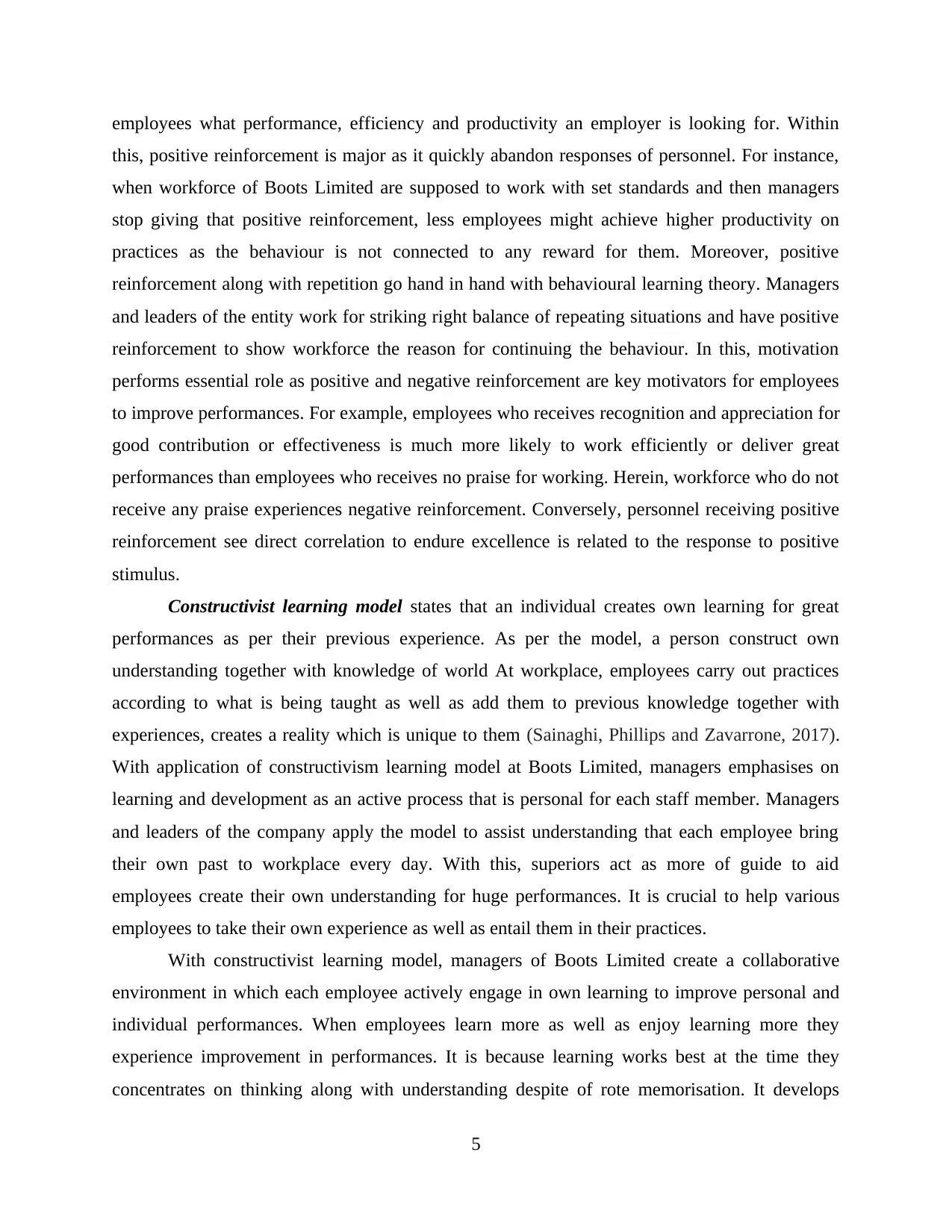
employees what performance, efficiency and productivity an employer is looking for. Within
this, positive reinforcement is major as it quickly abandon responses of personnel. For instance,
when workforce of Boots Limited are supposed to work with set standards and then managers
stop giving that positive reinforcement, less employees might achieve higher productivity on
practices as the behaviour is not connected to any reward for them. Moreover, positive
reinforcement along with repetition go hand in hand with behavioural learning theory. Managers
and leaders of the entity work for striking right balance of repeating situations and have positive
reinforcement to show workforce the reason for continuing the behaviour. In this, motivation
performs essential role as positive and negative reinforcement are key motivators for employees
to improve performances. For example, employees who receives recognition and appreciation for
good contribution or effectiveness is much more likely to work efficiently or deliver great
performances than employees who receives no praise for working. Herein, workforce who do not
receive any praise experiences negative reinforcement. Conversely, personnel receiving positive
reinforcement see direct correlation to endure excellence is related to the response to positive
stimulus.
Constructivist learning model states that an individual creates own learning for great
performances as per their previous experience. As per the model, a person construct own
understanding together with knowledge of world At workplace, employees carry out practices
according to what is being taught as well as add them to previous knowledge together with
experiences, creates a reality which is unique to them (Sainaghi, Phillips and Zavarrone, 2017).
With application of constructivism learning model at Boots Limited, managers emphasises on
learning and development as an active process that is personal for each staff member. Managers
and leaders of the company apply the model to assist understanding that each employee bring
their own past to workplace every day. With this, superiors act as more of guide to aid
employees create their own understanding for huge performances. It is crucial to help various
employees to take their own experience as well as entail them in their practices.
With constructivist learning model, managers of Boots Limited create a collaborative
environment in which each employee actively engage in own learning to improve personal and
individual performances. When employees learn more as well as enjoy learning more they
experience improvement in performances. It is because learning works best at the time they
concentrates on thinking along with understanding despite of rote memorisation. It develops
5
this, positive reinforcement is major as it quickly abandon responses of personnel. For instance,
when workforce of Boots Limited are supposed to work with set standards and then managers
stop giving that positive reinforcement, less employees might achieve higher productivity on
practices as the behaviour is not connected to any reward for them. Moreover, positive
reinforcement along with repetition go hand in hand with behavioural learning theory. Managers
and leaders of the entity work for striking right balance of repeating situations and have positive
reinforcement to show workforce the reason for continuing the behaviour. In this, motivation
performs essential role as positive and negative reinforcement are key motivators for employees
to improve performances. For example, employees who receives recognition and appreciation for
good contribution or effectiveness is much more likely to work efficiently or deliver great
performances than employees who receives no praise for working. Herein, workforce who do not
receive any praise experiences negative reinforcement. Conversely, personnel receiving positive
reinforcement see direct correlation to endure excellence is related to the response to positive
stimulus.
Constructivist learning model states that an individual creates own learning for great
performances as per their previous experience. As per the model, a person construct own
understanding together with knowledge of world At workplace, employees carry out practices
according to what is being taught as well as add them to previous knowledge together with
experiences, creates a reality which is unique to them (Sainaghi, Phillips and Zavarrone, 2017).
With application of constructivism learning model at Boots Limited, managers emphasises on
learning and development as an active process that is personal for each staff member. Managers
and leaders of the company apply the model to assist understanding that each employee bring
their own past to workplace every day. With this, superiors act as more of guide to aid
employees create their own understanding for huge performances. It is crucial to help various
employees to take their own experience as well as entail them in their practices.
With constructivist learning model, managers of Boots Limited create a collaborative
environment in which each employee actively engage in own learning to improve personal and
individual performances. When employees learn more as well as enjoy learning more they
experience improvement in performances. It is because learning works best at the time they
concentrates on thinking along with understanding despite of rote memorisation. It develops
5
Paraphrase This Document
Need a fresh take? Get an instant paraphrase of this document with our AI Paraphraser
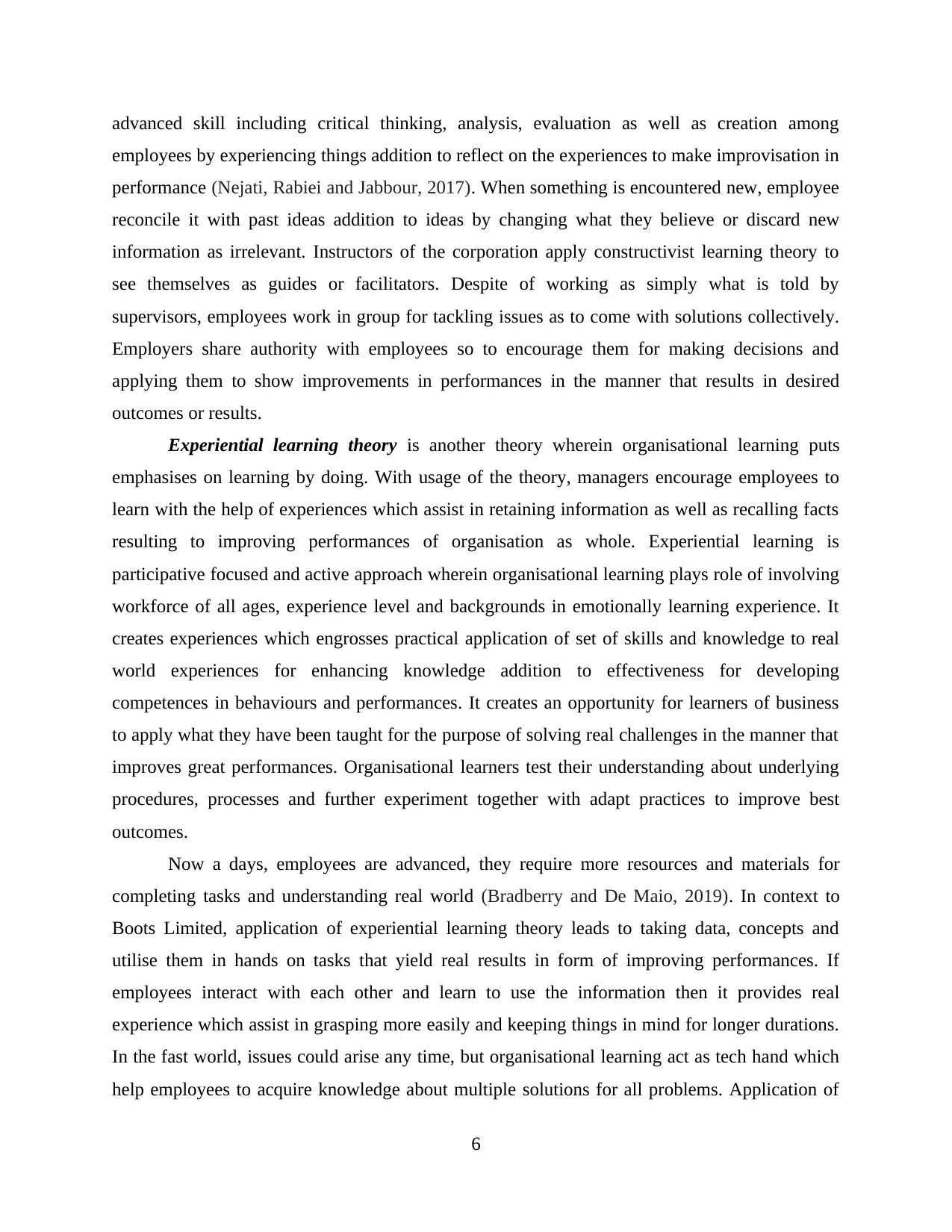
advanced skill including critical thinking, analysis, evaluation as well as creation among
employees by experiencing things addition to reflect on the experiences to make improvisation in
performance (Nejati, Rabiei and Jabbour, 2017). When something is encountered new, employee
reconcile it with past ideas addition to ideas by changing what they believe or discard new
information as irrelevant. Instructors of the corporation apply constructivist learning theory to
see themselves as guides or facilitators. Despite of working as simply what is told by
supervisors, employees work in group for tackling issues as to come with solutions collectively.
Employers share authority with employees so to encourage them for making decisions and
applying them to show improvements in performances in the manner that results in desired
outcomes or results.
Experiential learning theory is another theory wherein organisational learning puts
emphasises on learning by doing. With usage of the theory, managers encourage employees to
learn with the help of experiences which assist in retaining information as well as recalling facts
resulting to improving performances of organisation as whole. Experiential learning is
participative focused and active approach wherein organisational learning plays role of involving
workforce of all ages, experience level and backgrounds in emotionally learning experience. It
creates experiences which engrosses practical application of set of skills and knowledge to real
world experiences for enhancing knowledge addition to effectiveness for developing
competences in behaviours and performances. It creates an opportunity for learners of business
to apply what they have been taught for the purpose of solving real challenges in the manner that
improves great performances. Organisational learners test their understanding about underlying
procedures, processes and further experiment together with adapt practices to improve best
outcomes.
Now a days, employees are advanced, they require more resources and materials for
completing tasks and understanding real world (Bradberry and De Maio, 2019). In context to
Boots Limited, application of experiential learning theory leads to taking data, concepts and
utilise them in hands on tasks that yield real results in form of improving performances. If
employees interact with each other and learn to use the information then it provides real
experience which assist in grasping more easily and keeping things in mind for longer durations.
In the fast world, issues could arise any time, but organisational learning act as tech hand which
help employees to acquire knowledge about multiple solutions for all problems. Application of
6
employees by experiencing things addition to reflect on the experiences to make improvisation in
performance (Nejati, Rabiei and Jabbour, 2017). When something is encountered new, employee
reconcile it with past ideas addition to ideas by changing what they believe or discard new
information as irrelevant. Instructors of the corporation apply constructivist learning theory to
see themselves as guides or facilitators. Despite of working as simply what is told by
supervisors, employees work in group for tackling issues as to come with solutions collectively.
Employers share authority with employees so to encourage them for making decisions and
applying them to show improvements in performances in the manner that results in desired
outcomes or results.
Experiential learning theory is another theory wherein organisational learning puts
emphasises on learning by doing. With usage of the theory, managers encourage employees to
learn with the help of experiences which assist in retaining information as well as recalling facts
resulting to improving performances of organisation as whole. Experiential learning is
participative focused and active approach wherein organisational learning plays role of involving
workforce of all ages, experience level and backgrounds in emotionally learning experience. It
creates experiences which engrosses practical application of set of skills and knowledge to real
world experiences for enhancing knowledge addition to effectiveness for developing
competences in behaviours and performances. It creates an opportunity for learners of business
to apply what they have been taught for the purpose of solving real challenges in the manner that
improves great performances. Organisational learners test their understanding about underlying
procedures, processes and further experiment together with adapt practices to improve best
outcomes.
Now a days, employees are advanced, they require more resources and materials for
completing tasks and understanding real world (Bradberry and De Maio, 2019). In context to
Boots Limited, application of experiential learning theory leads to taking data, concepts and
utilise them in hands on tasks that yield real results in form of improving performances. If
employees interact with each other and learn to use the information then it provides real
experience which assist in grasping more easily and keeping things in mind for longer durations.
In the fast world, issues could arise any time, but organisational learning act as tech hand which
help employees to acquire knowledge about multiple solutions for all problems. Application of
6
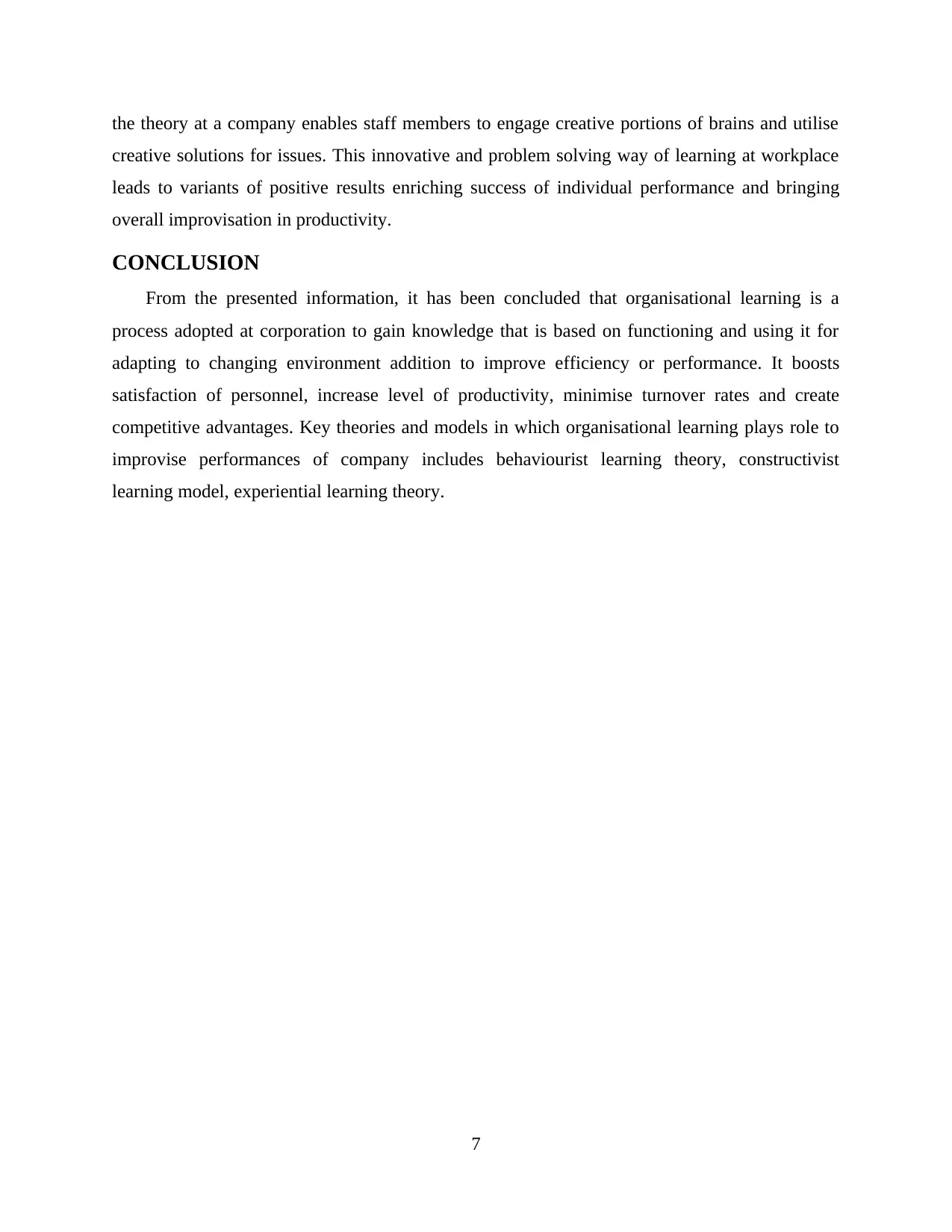
the theory at a company enables staff members to engage creative portions of brains and utilise
creative solutions for issues. This innovative and problem solving way of learning at workplace
leads to variants of positive results enriching success of individual performance and bringing
overall improvisation in productivity.
CONCLUSION
From the presented information, it has been concluded that organisational learning is a
process adopted at corporation to gain knowledge that is based on functioning and using it for
adapting to changing environment addition to improve efficiency or performance. It boosts
satisfaction of personnel, increase level of productivity, minimise turnover rates and create
competitive advantages. Key theories and models in which organisational learning plays role to
improvise performances of company includes behaviourist learning theory, constructivist
learning model, experiential learning theory.
7
creative solutions for issues. This innovative and problem solving way of learning at workplace
leads to variants of positive results enriching success of individual performance and bringing
overall improvisation in productivity.
CONCLUSION
From the presented information, it has been concluded that organisational learning is a
process adopted at corporation to gain knowledge that is based on functioning and using it for
adapting to changing environment addition to improve efficiency or performance. It boosts
satisfaction of personnel, increase level of productivity, minimise turnover rates and create
competitive advantages. Key theories and models in which organisational learning plays role to
improvise performances of company includes behaviourist learning theory, constructivist
learning model, experiential learning theory.
7
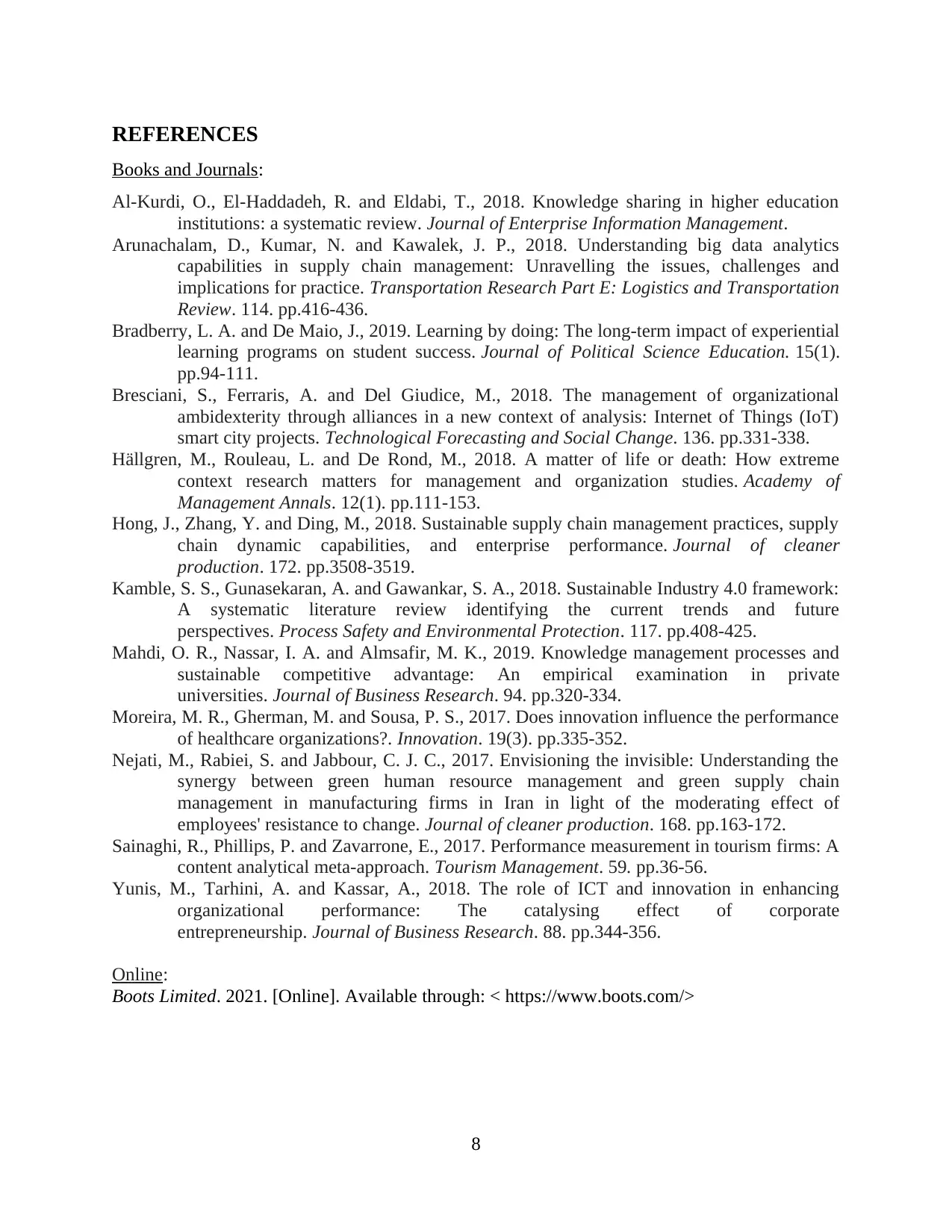
REFERENCES
Books and Journals:
Al-Kurdi, O., El-Haddadeh, R. and Eldabi, T., 2018. Knowledge sharing in higher education
institutions: a systematic review. Journal of Enterprise Information Management.
Arunachalam, D., Kumar, N. and Kawalek, J. P., 2018. Understanding big data analytics
capabilities in supply chain management: Unravelling the issues, challenges and
implications for practice. Transportation Research Part E: Logistics and Transportation
Review. 114. pp.416-436.
Bradberry, L. A. and De Maio, J., 2019. Learning by doing: The long-term impact of experiential
learning programs on student success. Journal of Political Science Education. 15(1).
pp.94-111.
Bresciani, S., Ferraris, A. and Del Giudice, M., 2018. The management of organizational
ambidexterity through alliances in a new context of analysis: Internet of Things (IoT)
smart city projects. Technological Forecasting and Social Change. 136. pp.331-338.
Hällgren, M., Rouleau, L. and De Rond, M., 2018. A matter of life or death: How extreme
context research matters for management and organization studies. Academy of
Management Annals. 12(1). pp.111-153.
Hong, J., Zhang, Y. and Ding, M., 2018. Sustainable supply chain management practices, supply
chain dynamic capabilities, and enterprise performance. Journal of cleaner
production. 172. pp.3508-3519.
Kamble, S. S., Gunasekaran, A. and Gawankar, S. A., 2018. Sustainable Industry 4.0 framework:
A systematic literature review identifying the current trends and future
perspectives. Process Safety and Environmental Protection. 117. pp.408-425.
Mahdi, O. R., Nassar, I. A. and Almsafir, M. K., 2019. Knowledge management processes and
sustainable competitive advantage: An empirical examination in private
universities. Journal of Business Research. 94. pp.320-334.
Moreira, M. R., Gherman, M. and Sousa, P. S., 2017. Does innovation influence the performance
of healthcare organizations?. Innovation. 19(3). pp.335-352.
Nejati, M., Rabiei, S. and Jabbour, C. J. C., 2017. Envisioning the invisible: Understanding the
synergy between green human resource management and green supply chain
management in manufacturing firms in Iran in light of the moderating effect of
employees' resistance to change. Journal of cleaner production. 168. pp.163-172.
Sainaghi, R., Phillips, P. and Zavarrone, E., 2017. Performance measurement in tourism firms: A
content analytical meta-approach. Tourism Management. 59. pp.36-56.
Yunis, M., Tarhini, A. and Kassar, A., 2018. The role of ICT and innovation in enhancing
organizational performance: The catalysing effect of corporate
entrepreneurship. Journal of Business Research. 88. pp.344-356.
Online:
Boots Limited. 2021. [Online]. Available through: < https://www.boots.com/>
8
Books and Journals:
Al-Kurdi, O., El-Haddadeh, R. and Eldabi, T., 2018. Knowledge sharing in higher education
institutions: a systematic review. Journal of Enterprise Information Management.
Arunachalam, D., Kumar, N. and Kawalek, J. P., 2018. Understanding big data analytics
capabilities in supply chain management: Unravelling the issues, challenges and
implications for practice. Transportation Research Part E: Logistics and Transportation
Review. 114. pp.416-436.
Bradberry, L. A. and De Maio, J., 2019. Learning by doing: The long-term impact of experiential
learning programs on student success. Journal of Political Science Education. 15(1).
pp.94-111.
Bresciani, S., Ferraris, A. and Del Giudice, M., 2018. The management of organizational
ambidexterity through alliances in a new context of analysis: Internet of Things (IoT)
smart city projects. Technological Forecasting and Social Change. 136. pp.331-338.
Hällgren, M., Rouleau, L. and De Rond, M., 2018. A matter of life or death: How extreme
context research matters for management and organization studies. Academy of
Management Annals. 12(1). pp.111-153.
Hong, J., Zhang, Y. and Ding, M., 2018. Sustainable supply chain management practices, supply
chain dynamic capabilities, and enterprise performance. Journal of cleaner
production. 172. pp.3508-3519.
Kamble, S. S., Gunasekaran, A. and Gawankar, S. A., 2018. Sustainable Industry 4.0 framework:
A systematic literature review identifying the current trends and future
perspectives. Process Safety and Environmental Protection. 117. pp.408-425.
Mahdi, O. R., Nassar, I. A. and Almsafir, M. K., 2019. Knowledge management processes and
sustainable competitive advantage: An empirical examination in private
universities. Journal of Business Research. 94. pp.320-334.
Moreira, M. R., Gherman, M. and Sousa, P. S., 2017. Does innovation influence the performance
of healthcare organizations?. Innovation. 19(3). pp.335-352.
Nejati, M., Rabiei, S. and Jabbour, C. J. C., 2017. Envisioning the invisible: Understanding the
synergy between green human resource management and green supply chain
management in manufacturing firms in Iran in light of the moderating effect of
employees' resistance to change. Journal of cleaner production. 168. pp.163-172.
Sainaghi, R., Phillips, P. and Zavarrone, E., 2017. Performance measurement in tourism firms: A
content analytical meta-approach. Tourism Management. 59. pp.36-56.
Yunis, M., Tarhini, A. and Kassar, A., 2018. The role of ICT and innovation in enhancing
organizational performance: The catalysing effect of corporate
entrepreneurship. Journal of Business Research. 88. pp.344-356.
Online:
Boots Limited. 2021. [Online]. Available through: < https://www.boots.com/>
8
Secure Best Marks with AI Grader
Need help grading? Try our AI Grader for instant feedback on your assignments.

9
1 out of 11
Your All-in-One AI-Powered Toolkit for Academic Success.
+13062052269
info@desklib.com
Available 24*7 on WhatsApp / Email
![[object Object]](/_next/static/media/star-bottom.7253800d.svg)
Unlock your academic potential
© 2024 | Zucol Services PVT LTD | All rights reserved.



